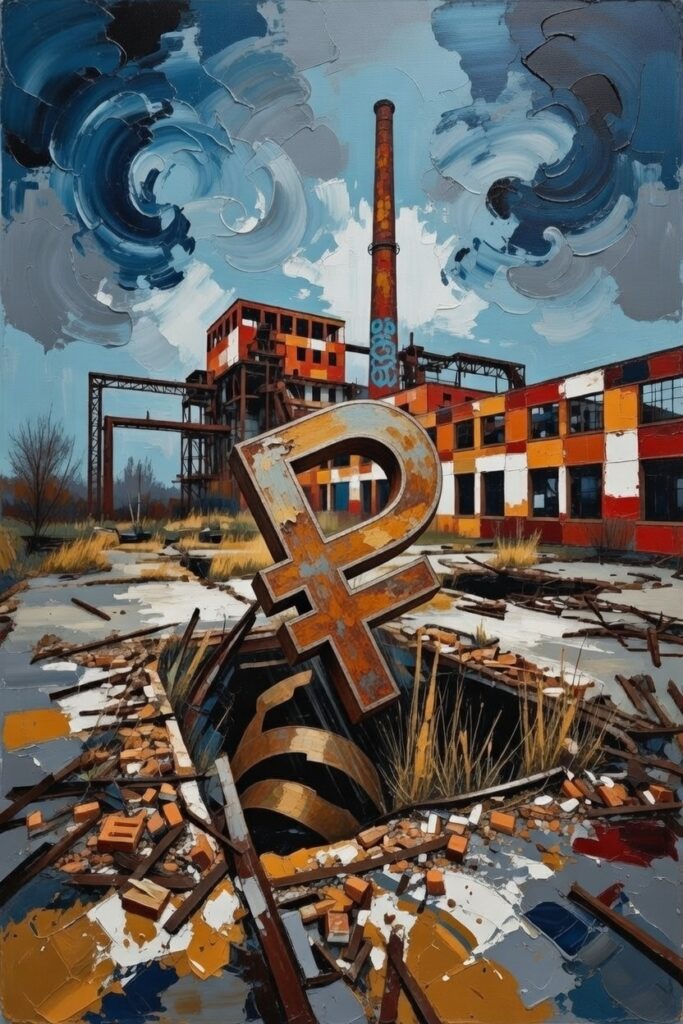Rosstat’s inexplicable decision to withhold monthly retail, wholesale trade, income, and salary data from its June release is the sort of move self-confident governments make, right? For now, ignore the chatter about a deal with the Trump administration. Not only is no deal sacred to this administration, but the legal logic of the state’s response to sanctions and the market capture by businesses since means the «cavalry» isn’t coming. There will be no flood of foreign investment, no matter what. More pressing in the immediate term is how the regime is actively trying to hide the pain felt by households.
Reconciled data between Rosstat and Sberbank shows that real wage growth is, for all intents and purposes, stagnant. Banks are expecting the government to scale back subsidy support as budgetary pressures intensify. The Ministry of Finance is issuing debt at a breakneck pace this year—2.8 trillion rubles so far. The impending spending squeeze, as oil market pressures tighten, will leave families worse off. With that in mind, banks providing subsidized mortgages that survived the June 2024 suspension of the main national program now require borrowers to deposit 30.1% of the property’s value upfront, up from 20.1%. Even as housing prices fall, that’s a hefty commitment, particularly as aggregate wages lag behind cost-of-living increases for most people. Though difficult to quantify, we suspect a growing share of businesses across the economy will demand larger upfront payments instead of credit as conditions deteriorate further. Setting aside the quality of data on subprime loans, there is a clear, sharp upward trend in negative indicators, understating the challenges for Russians reliant on informal credit or only able to access credit at exorbitant interest rates.
The Trump administration appears to be ramping up sanctions pressure directly and through its ongoing trade war, compounding these issues. India’s state refiners are reportedly shunning Russian crude cargoes, though it’s worth noting that the majority of India’s oil is refined by privately-owned operators. More intriguing is word that banks in the UAE are scrutinizing accounts held by Russians and Russian entities. The most concerning indicator, however, comes from China, where consumer retail turnover is still growing annually but has been trending downward since April. China may continue buying Russian oil exports despite U.S. tariff threats, but June marked a milestone: «new energy» vehicles—battery electrics, plug-in electrics, and hybrids (often with range extenders)—accounted for over half of light vehicle sales, totaling 1.071 million units for the month. Combined with weakening consumer demand growth amid uncertainty, oil faces a tough five months ahead, propped up largely by the potential for more aggressive action against Russian exports.
The loan and wage growth data is so alarming because no cushion is forthcoming from the redistribution of energy rents or the deficit spending prioritized by the Ministry of Finance and the state. Others are better equipped to analyze the extent to which internal debts—often subsidized and subordinated—are accumulating within the banking sector and among defense enterprises. Our main skepticism about the narrative of a financial crisis is that these debts are owed domestically. Debts are, after all, contracts that can be renegotiated or reshaped through a handshake or a raid at gunpoint. The real crisis lies in the «real economy”—the flow of money and profits driven by the demand for goods and services and their supply. Profits are declining, with consumer goods hit hardest. Rail shipments are starting to tumble, down 7.4% compared to 2024, while RZhD reflects broader issues like the slowdown of virtually all business investment except for wartime industries. The loss of revenues from coal exports and oil shipments means precious little capital is being reinvested into the rail system, which will become a significant drag on economic activity.
As the labor market weakens slightly and these shifts in financial flows accumulate, businesses will be caught trying to raise prices to protect their bottom line while slowing wage increases. The current balance is unsustainable. If the average monthly salary is nearly 100,000 rubles, the weakness of import demand has contributed to a stronger ruble, and most forms of investment are declining, there’s no way the official inflation rate holds up. The fact that this data is now being withheld or manipulated suggests things are dire. Consumer sentiment surveys simply don’t align with spending patterns on goods and services. Something is breaking, and rate cuts alone won’t mend the damage.
The situation is so severe that Putin has ordered a review of 170 state-owned or partially state-owned companies whose headquarters could be relocated from Moscow to the regions. This is the kind of proposal political parties resort to when they want to convince voters they’re tackling regional inequality without a clear plan—unsurprising, given its resemblance to the British Tories’ obsession with moving government jobs out of London or similar whispers from Washington. Rosstat’s inflation reports show prices fell for the second week in a row, which would be positive if growth were stable. It isn’t. While Medvedev complains that Trump’s tariffs are creating global imbalances, Putin raises import costs for Chinese automobiles and increases visa fees for workers. The only way to restore balance to the Russian economy is to freeze the front in Ukraine and scale back military production. Since that’s impossible, we’re left with virtual policymaking for real problems.
The more that major economic data is suppressed, buried, or manipulated, the worse the «real» news appears. Countries can outrun a collapse in investment into core needs for a few years, but not indefinitely—especially when manufacturing labor and military demands stretch the workforce to its limits. We’re now seeing evidence of this tradeoff expand from narrow inconveniences—like failing utilities or fires due to neglected inspections—to material losses for large businesses and household earnings. Because of labor shortages, if falling interest rates revive sectors like home construction, which suffered deeply in the first half of the year, inflation will resume its relentless upward march. The entropy of the war has overtaken officials’ ability to solve problems without creating new ones.










